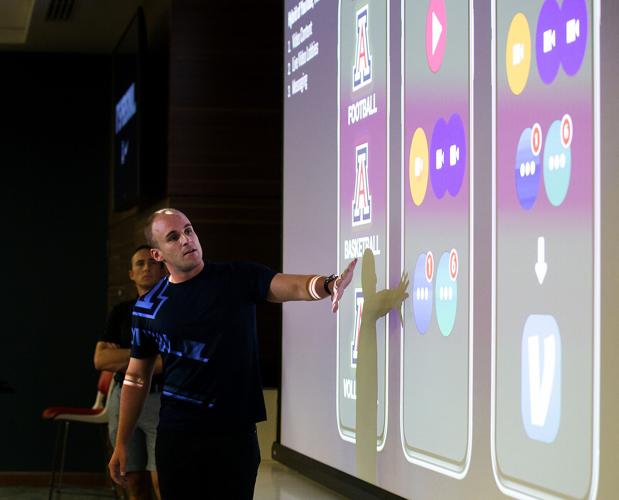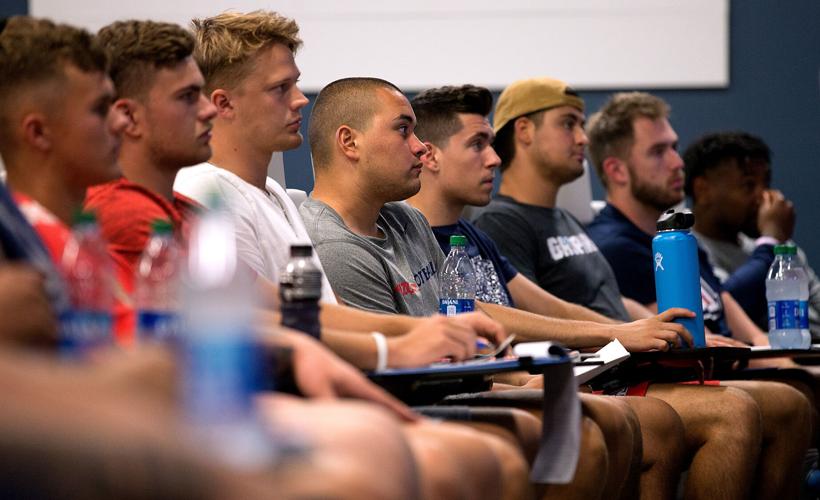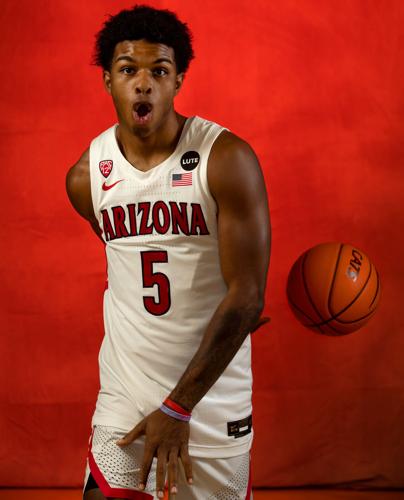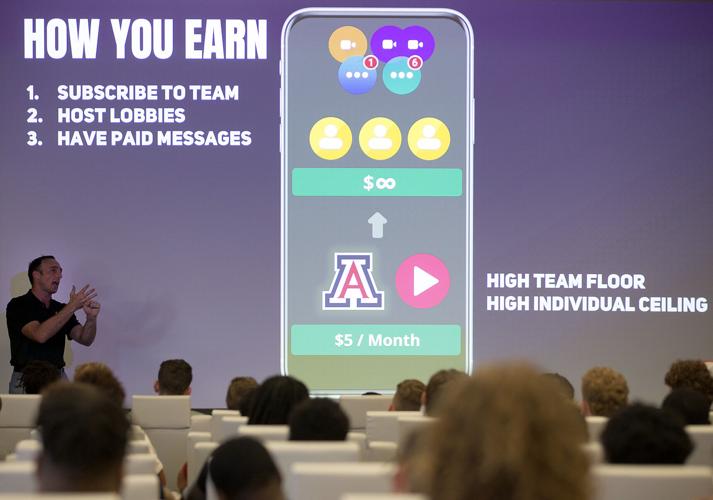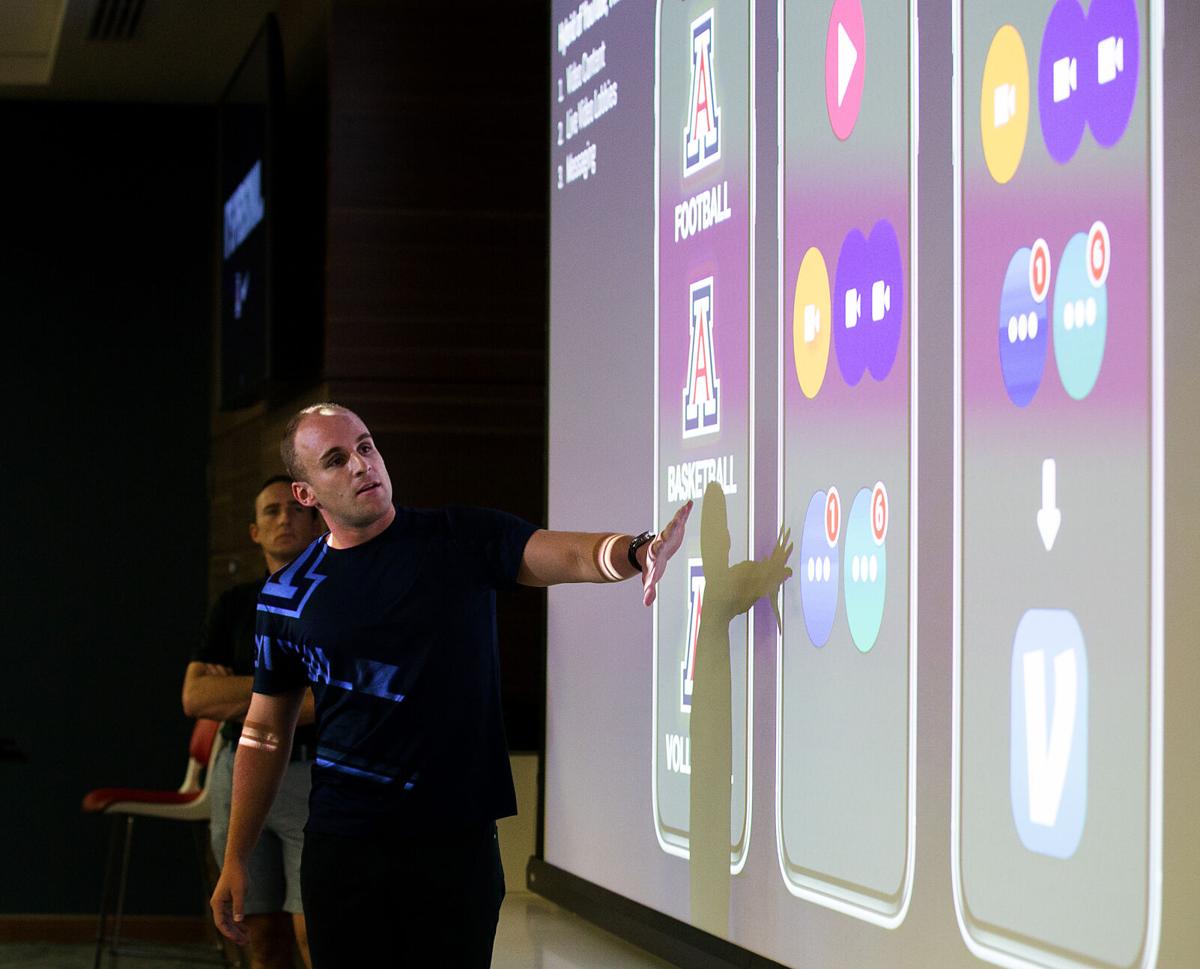For years, those who argued against college athletes profiting from their name, image and likeness portended visions of Cadillacs and caviar corrupting the sport they love.
“It’ll be a feeding frenzy!” they shouted.
“It’s the end of Western civilization,” they hollered.
“These greedy kids will only look out for themselves,” they worried.
But the financial gain derived from the ground-breaking NIL legislation enacted in July is only part of the story.
What has driven Arizona student-athletes more is the ability to own their image now, and with it, control their destinies.
“I don’t think it’s all about money,” Arizona senior guard Justin Kier said. “It’s about connections. If you get along with a company, and you’re doing things right, it proves that basketball isn’t the only option for you. It allows us to express ourselves as individuals, and it allows an outside audience to get to see the inside of you. Food spots, car dealerships — you can be in the public eye, but also express yourself.”
Now, through a partnership with DYME, a new social media and content platform, Arizona athletes have direct access to Wildcat fans — and NIL revenue — in a way they’ve never had before.
Forget the money, the Cats say. What they really have now is their voice.

The UA football team listens to a presentation by DYME, a company that helps student-athletes make money under the NCAA’s new name, image and likeness policy, at the Lowell-Stevens Football Facility on Aug. 12.
‘This would’ve worked for us’
Like Kier, Koi Love is new to the Tucson campus. A transfer from Vanderbilt — Kier arrived from SEC school Georgia — Love sat in on a summer presentation between the DYME team and the Arizona men’s basketball team.
What she heard wowed her.
“This app is going to give us a chance to be a lot more intimate with the fans,” Love said. “There are things that are taboo, or might not be the right thing to share. That is so important, to be able to hold the narrative in our own hands. To give our true, authentic selves. Instagram, Facebook — that’s pictures. That’s like, fake. Being able to interact with us, I think this app will really be special. If fans can use it correctly, it will give us a look at who we are.”
DYME signed an exclusive agreement with Arizona student-athletes to launch their platform, onboarding with five programs — men’s and women’s basketball, baseball and softball and women’s volleyball.
Created by former Texas Longhorns baseball player George Pappas, DYME operates under the belief idea that college athletes should be able to monetize something they’ve done for free for an entire generation.
“The people work with and represent DYME all have an athletic background; it was built around the premise of ‘This would’ve worked for us,’” Pappas said. “Players are used to doing interviews, communicating with fans, having cameras in front of their face — they just haven’t been paid to do it. Now they’re the ones with the control.”
There still remains a Wild West feeling around the NIL changes, like we’re dealing with unchartered territory.
Brent Blaylock, the UA’s senior associate athletic director in charge of administration and institutional control, said the school wants to be at the forefront of the NIL landscape. While no Arizona athletes have landed a seven-figure endorsement deal, conversations are being had every day about how the Wildcats can capitalize. The student-athletes’ direct partnership with DYME — Blaylock clarified that the school is not officially partnered with the new platform, though it did facilitate the conversations between the two parties — is a big first step.
For both Arizona and DYME, which continues to seek partnerships with schools and teams across the country.
“We’re excited for student-athletes being able to monetize this access,” Blaylock said. “We’re excited to see where this can go with student-athletes engaging directly with fans. We know our student-athletes are excited about it. From the very start, we committed to them that we were doing everything we can as a department to open up opportunities for them. When we were approached by George about DYME, we thought it was a very interesting opportunity.”

J.T. Rogan, lower right, director of business development at DYME, makes a presentation to the University of Arizona football team in August.
‘We want to do things that are uncommon’
In the world of Hollywood, they call it “gold,” and Adia Barnes had it.
This was prime-time footage, here, Oscar-worthy. At least maybe in the documentary category.
Here was the head coach of the Arizona women’s basketball team, looking directly into her players’ eyes, imploring them to seize the opportunity. The night before, she’d been awake from 2 a.m. to 5 a.m., feeding, burping and getting pooped on by her infant daughter, Capri.
Now she was coaching the biggest game in her life against Geno Auriemma and mighty UConn in the Final Four.
“If I would’ve had a GoPro on, I would’ve had a million followers on Instagram,” she said. “To look them in the eyes and say no one believe in us, no one thought we’d be here. People left us out of videos. … I said you know why? Because we’re going to the championship. They were looking in my eyes. I remember looking at them, and they were hanging on every word. They were connected to me, with me, believing. So confident. It was so special. I hope I have that feeling again. It was about how we did it. How we were together.”
If only, she says, she could’ve invited the fans into that locker room with her and the Cats.
Now they can, and her players are benefiting from it.
“At Arizona, with this new relationship with DYME, there’s a tremendous opportunity for us to be one of their first schools,” Barnes said. “We want to do things that are uncommon at ‘Zona. This is the start of something big.”
A fearless coach on the court, Barnes bucks the trend of college coaches who decried the NIL changes for years. Unlike the Dabo Swinneys of the world — who seem to believe that they are entitled to make millions of dollars in college athletics, just not necessarily the athletes — Barnes believes this was long overdue.
“I have no trepidation at all,” she said. “This is something that needed to happen. We’re going to see even more things happen that shock a lot of people. It was about time. People thought it would be more of an immediate impact. I think it’s going to slowly happen. A lot of companies have been hesitant — student-athletes are a click away from destroying an image — so there’s been some reluctancy. But you see Paige Bueckers getting some big deal, and this DYME relationship here, it’s like, ‘You go here, you go here and don’t do something dumb online.’”
While many believed the new rules on governance — which saw governing bodies in all three NCAA divisions adopting a uniform interim policy suspending NCAA name, image and likeness rules for all incoming and current student-athletes in all sports — would have an immediate impact, Blaylock, like Barnes, is not surprised by the relative quiet.
Heck, the rules still haven’t even solved all issues. International student-athletes still cannot be paid for their NIL — a group that, at Arizona, includes many of the Wildcats’ best and brightest.
“When all the forecasts were coming out, everyone thought a bunch of businesses would be ready to pounce,” Blaylock said. “Really, it’s been the opposite. We have student-athletes who are ready to go, ready to learn about business and how they can contribute, and it’s getting the businesses up to speed. … The ones having to evolve have been the business entities. Seemingly forever, that’s something they couldn’t engage in. It’s sort of evolving their thinking. That’s been, to us, one of the interesting things. Connecting with local, regional and even national businesses and saying this is OK to do. Our student-athletes can provide something specific that has value, and it’s not about convincing (businesses) but explaining to them that this is now all permissible.”

Guard Justin Kier said attending a "basketball school" helps with his personal branding.
‘The opportunities are limitless’
When Kier was looking for a new school after being given a sixth season of eligibility — he played his first four years at George Mason before transferring to Georgia, and then to Arizona — he was looking for a program in the spotlight.
“That’s one of the reasons I chose to come here, to be part of a ‘basketball school,’ a part of a blue blood,” he said. “I’ve already seen it in spurts. Man, they dig into Arizona basketball. It comes with excitement, pressure, a lot of things. To get where I want to go, and I know the team as well, you have to go through that. With his fan base, the DYME program can only blow us up. We’re like the Lakers in Tucson. People want to know about LeBron, AD and Russ do.
“Hopefully they want to dig in with us as well.”
Allured by Arizona’s championship history — “Imagine the legends Arizona has had — Igoudala, Jefferson — going to the Elite 8 with this?” — Kier believes the NIL changes will bring fans closer to the players than ever.
“We’re not test dummies — we’re allowed to be ourselves,” he said. “They’re letting us choose content. We do what we want to do.”
For Love, that means exposing her frustrations and passions, vulnerabilities and successes.
“The opportunities are limitless,” she said. “I don’t even think the sky is the limit. I believe this can be a special way for fans to be a part of the team, almost. As much as we’re willing to share, they’re willing to watch.”
That intimacy is what Pappas thinks will be the platform’s drawing point, especially with nonrevenue teams that nevertheless have a loyal following.
“Nationally, some sports get overlooked,” Pappas said. “And that was part of our thesis — just because you might be overlooked, it doesn’t mean there is not essential value. Arizona has a huge, huge following and it resonates more when you have programs that are more intimate. When we were trying to get our first school, we said when we get our first one, we’re going to shut it down and focus with that one school.
“Arizona said they were in, and we locked in. That’s how important it was — their commitment with us.”
Blaylock said, like Barnes, that the other four head coaches with teams on the platform have embraced the new frontier.
“All of our coaches have been very supportive of the opportunity,” he said. “They understand what a unique and meaningful platform this is. It helps humanize them, it helps remind everybody, these are 18-, 19-, 20-year-old adults who are going through a very meaningful but pressure-packed experience. They’re figuring it out how they go along. To see their personality and challenges, it will help connect with them more when they see them on the court or the field.”


